BCS Supported Standards FAQs
Answers to common questions regarding information on specific standards supported by BCS
What measurement standards are supported by QuantityWare BCS?
The Supported Standards Manuals for BCP and BCG list all supported measurement standards by QuantityWare BCS.
To ensure that you have all measurement standards – listed in these two documents – as template conversion groups available in your client 045, you should always apply the latest BCS CSP to your system.
A measurement standard update is always comunicated via a news item.
The Supported Products Manual provides detailed information which products are supported with BCS.
What are the differences between the various ASTM D1250 versions?
ASTM D1250 defines volume correction factor calculations and mass-to-weight conversion calculations (via API MPMS adjuncts).
Several working papers are available in the QuantityWare Knowledge Base, that explain the differences in great detail:
- Comparison of ASTM D1250-80 and ASTM D1250-04
- Comparison of ASTM D1250-80 and ASTM D1250-08
- Comparison of ASTM D1250-04 and ASTM D1250-19
- Comparison of ASTM D1250-80 and GPA 8217
Read the BCP Supported Standards Manual to find out which ASTM D1250 tables for which year (1952/1980/2004/2007/2008 …) are supported.
Does QuantityWare BCP support ISO 91:2017 and what are the corresponding template conversion groups?
Yes.
QuantityWare BCP supports ISO 91:2017 since 2010.
How do I identify the relevant conversion groups?
The QuantityWare ISO 91:2017 Consulting Paper provides detailed Petroleum Measurement Cockpit selection options such that you can easily identify all ISO 91:2017 compliant conversion groups.
If you have installed BCS 30A CSP02 or BCS 30B CSP01 (released September 2021), you may select one of the new ISO 91:2017 template conversion groups for crude oil, products and LPG.
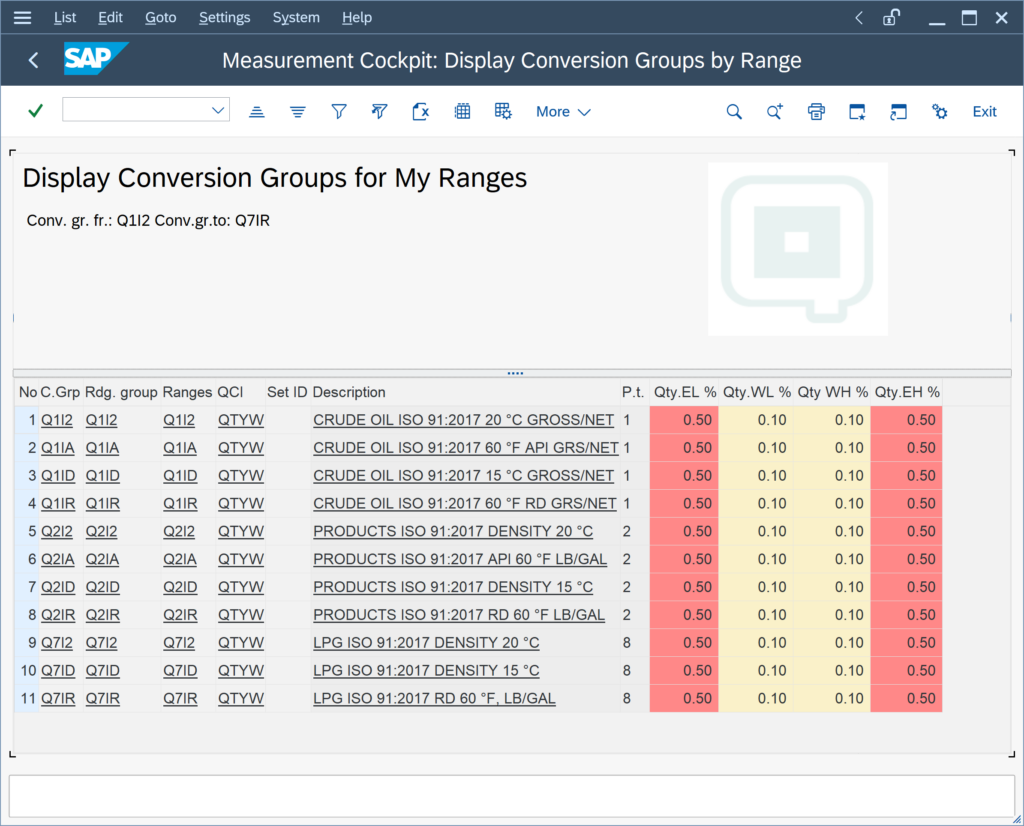
Does QuantityWare BCP support calculations of gross and net volumes, masses and weights for crude oil?
Yes.
The American Petroleum Institute (API) defines the following quantities in e.g. API MPMS Chapter 12.1.1, which can be mapped to a distinct SAP Dimension ID (DIMID):
- GOV – gross observed volume <-> SAP DIMID GRSVOL, All UoM w/o standard temperature
- GSV – gross standard volume <-> SAP DIMID GRSVOL, All UoM with standard temperature assigned
- NOV – net observed volume <-> SAP DIMID VOLUME, All UoM w/o standard temperature
- NSV – net standard volume <-> SAP DIMID VOLUME, All UoM with standard temperature assigned
- GSW –
Does QuantityWare BCS support Brazilian measurement standards?
Yes.
With respect to quantity conversion calculations used in the processing and sale of gasoline, diesel, LPG and ethanol, Brazil defines its own national measurement standards with which oil, gas, and energy companies operating in Brazil must comply. QuantityWare supports all such standards, as described in the consulting note 000117.
Can we calculate our crude oil and products weights via Table 13M (Chile)?
Yes.
In Chile, a modified ASTM D1250-80 Table 13, called Table 13M, is in use within the oil industry.
At a base temperature of 60°F, for a given API gravity at 60 °F (density in vacuo) – in the range 0 to 85 °API, the table provides the density in air in kg/L (kg/dm³) for weight calculations. This table 13M is part of the QuantityWare BCP delivery:
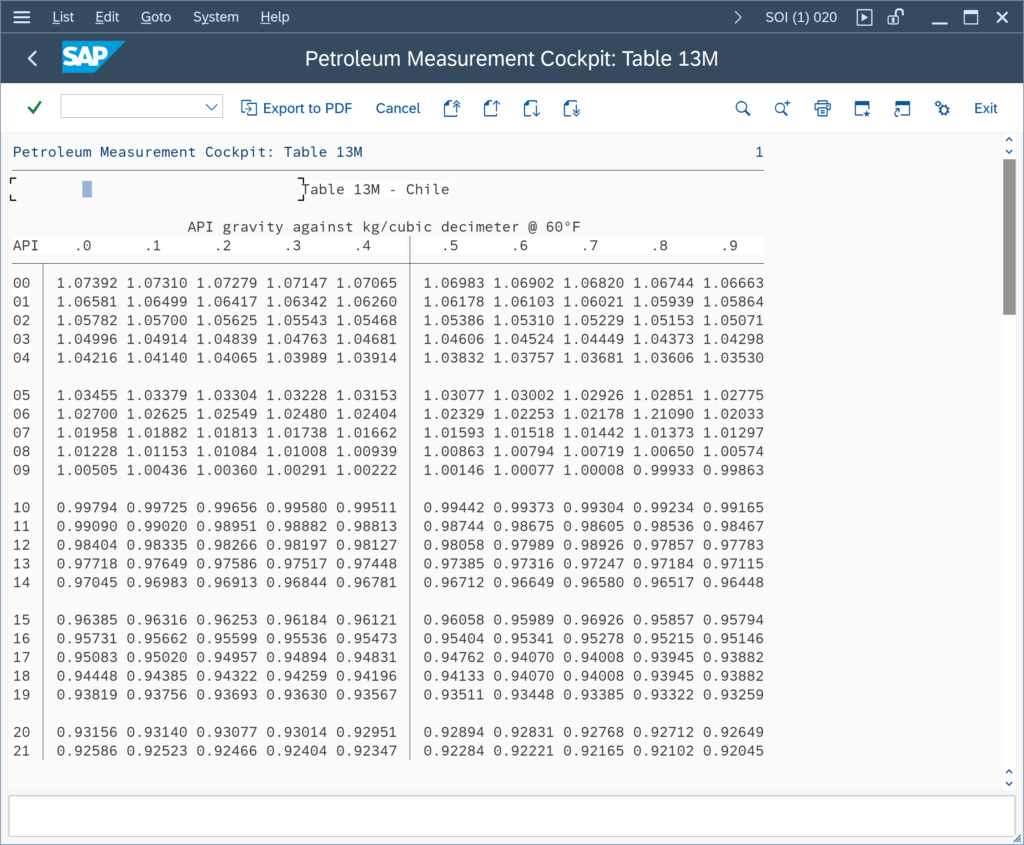
With note 000115, a GCD (Generic Customer Development) is made available to fulfill the requirement, such that for crude oil and products,
Does QuantityWare BCS support German industry standards DIN 51757 and 51650?
Yes.
QuantityWare supports the DIN 51650 calculation model as well as the specific DIN 51757 X and Y methods for LPG, asphalt, industrial aromatic hydrocarbons and bulk chemicals, which extend the ASTM D1250-80 support defined in DIN 51757 for the missing support of these products between 1980 and 2007:
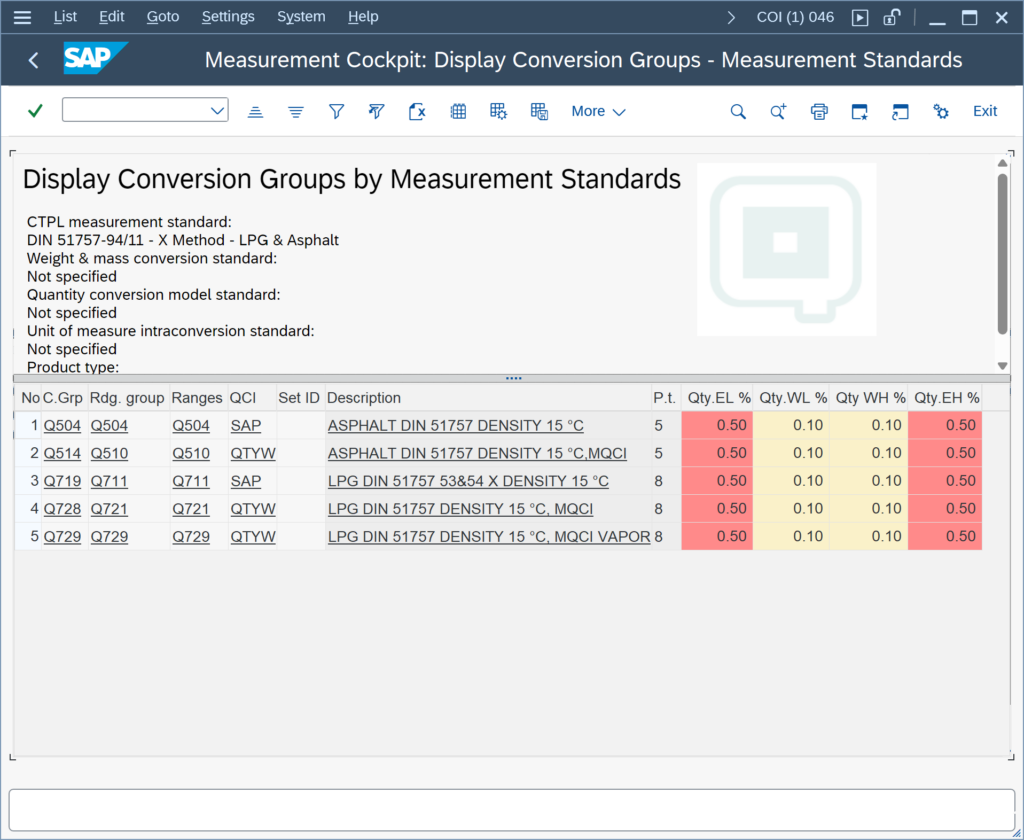
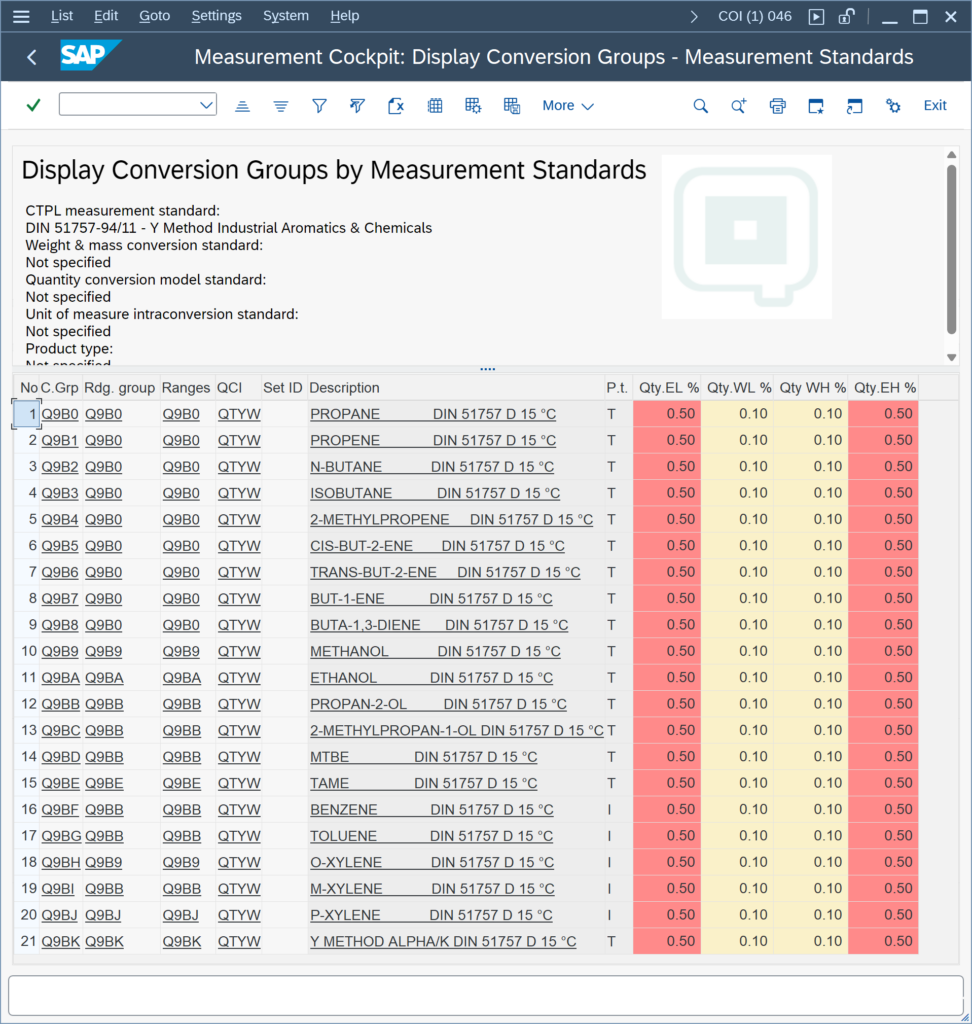
Can we calculate LPG total volume (vapor plus liquid) quantities?
Yes.
This is possible via a Generic Customer Development (GCD).
QuantityWare BCS MQCI conversion groups for LPG/NGL may be configured to calculate total masses, energies and weights, as defined in ISO 6578. Total volume calculations are not part of the standard BCS delivery.
With note 000098, a generic customer development (GCD) is made available, which enables such calculations, utilizing an API MPMS Chapter 14.8 formula approach.
QuantityWare Certified Consultants (QWCC) have access to this GCD via the Support Portal.
Does QuantityWare BCP support ethanol and ethanol/gasoline blends?
Yes.
Ethanol is globally utilized as an important feedstock and in gasoline blends (e.g. E5, E7 , E10 blends).
Pure/denatured ethanol – 95% ethanol and higher:
- Ethanol conversions are supported with Brazilian standard ABNT NBR 5992-80, ABNT NBR 5992-08 and ABNT NBR 5992-16. This standard is implemented for all versions in BCP 3.0. This standard calculates volumes (at the base temperature of 20 °C and various alternate temperature bases) and masses and weights (total product and alcohol portion) based on the input values (mass ratio and observed volume or test density) for a temperature range of 10 °C to 40 °C.
Which chemical components can I add to an ISO 6578 LPG reading group?
ISO 6578 provides two density calculation methods for LPG density calculations, based on the known chemical composition of the LPG. Very large factors may have to be applied for the correction of observed density to density at standard temperature, e.g. a correction for the effect of a temperature difference of 60 °C may be necessary for refrigerated propane. Provided that the LPG does not contain more than 20 % of unsaturated hydrocarbons, the correction tables introduced in ISO 91 shall be used for volume corrections. Thus, ISO 6578 is intended for LPG products that contain more than 20 % of unsaturated hydrocarbons (e.g.
What options do we have for ISO 6578 LNG density calculations from composition?
QuantityWare BCG supports the ISO 6578 (Version 1991 and 2017) density calculations for LNG. As described in Note 000076, the main difference between these two versions is the definition of configuration data, i.e. the k1 and k2 factors and orthobaric molar volumes. Customers may wish to utilize their own, contractually defined, calculation data sets.
NOTE: This is a critical task for any LNG implementation, thus a certified BCG consultant is required to support this task.
You have three options to define the density calculations:
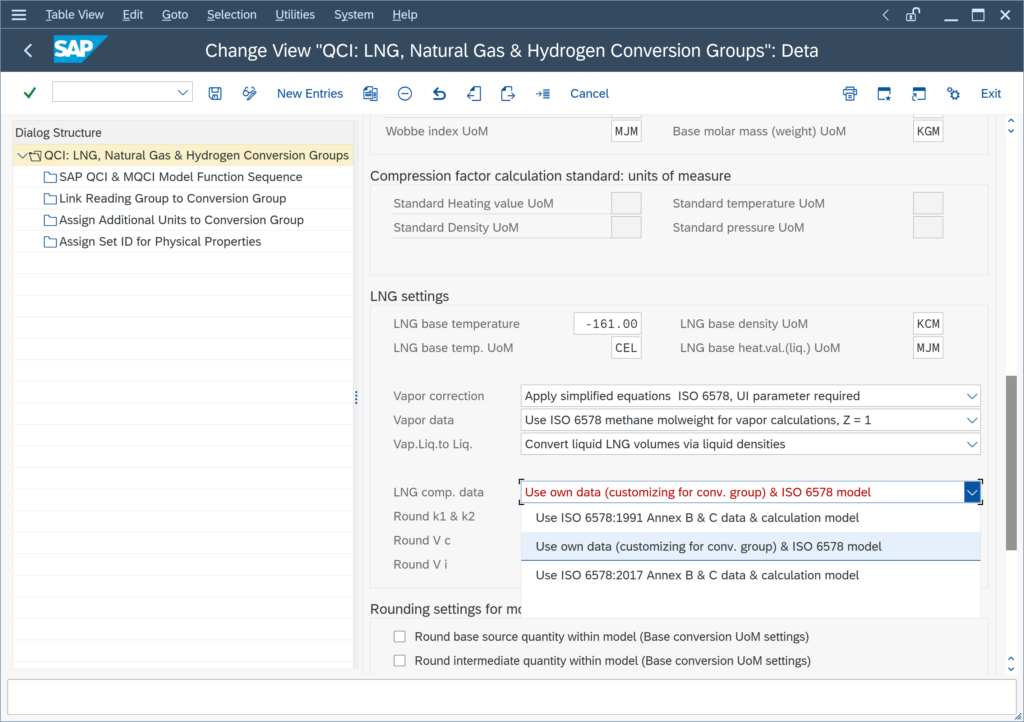
- Utilize ISO 6578:1991 data –



